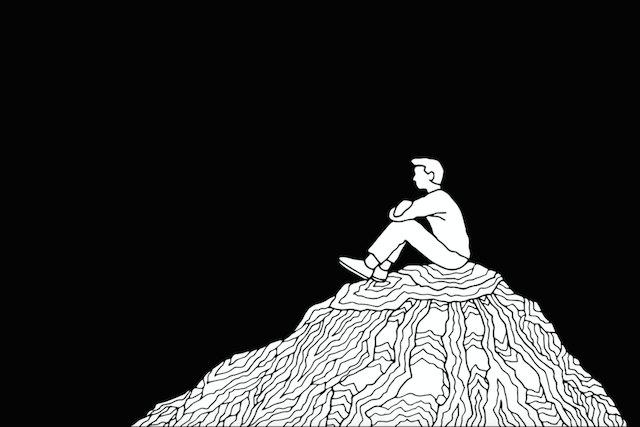Picture yourself looking at your phone, scratching your head.
Your friend cancelled on you again. And you’re pretty sure it’s because of anxiety.
You care about them. You believe in their good qualities. You enjoy them as a person.
But you have no idea what to do when this keeps happening.
You want to help, but it seems like you can’t.
It’s frustrating
What is the right thing to say?
It there any way to actually make a difference?
Here are seven things you can do to support your friend who struggles with anxiety.
#1: Show Up
Wanna know the single most helpful thing you can do for your friend who struggles with anxiety?
Show up. Be present. Care.
It’s harder than it sounds.
It’s human nature to want to fix things. But you definitely can’t fix this one for them.
It’s also human nature to get frustrated with things that you don’t understand and can’t control.
Unfortunately, that’s kinda the definition of anxiety.
If you have a friend with anxiety, you’re gonna be tempted to skip calling them sometimes, because the anxiety might make them hard to deal with. (Okay, let’s be real. You were probably texting anyway. Because how often does your friend with anxiety want to talk on the phone?)
But here’s the thing. They need you. The best part of you.
They don’t need your criticism. They don’t really need your advice (and more than likely don’t want it either).
But they do need you.
Most people with anxiety are self-conscious about it. They feel guilty, and they worry that other people won’t accept them. That sets up a cycle that feeds the anxiety and makes it worse.
It matters that you keep showing up, week after week. Especially if their anxiety prompts them to do frustrating things sometimes. And especially on the days they can’t reciprocate as well as they would like.
When you are present for your friend, it says you see their worth—whether or not they have anxiety. And that invites them to see the same thing in themselves.
#2: Don’t Try to Fix it
It’s tempting, I know.
When you watch someone struggling with anxiety, it’s hard to make sense of their reactions.
Coping more effectively with a situation seems so simple. . . and it is. To people not dealing with anxiety.
You want to give them advice, to tell them how to just be different.
Don’t.
Accept that their body is creating physiological processes that you can’t understand because you aren’t inside them. Those reactions are incredibly hard to deal with.
Most people with anxiety already know that their behavior doesn’t make sense. That’s because anxiety is processed in the emotion centers of the brain. The reasonable, logical part operates separately. People can both know their reaction is out of proportion to the situation and be unable to change it.
And yes. It sucks.
Your friend has probably read articles explaining this. They may have talked to therapists or watched videos about ways to work with these different parts of the brain. Chances are they have tried lots of techniques—breathing exercises, pressure points, meditation, affirmations.
But they don’t want to explain all that every time someone notices they seem anxious and rushes to give advice.
For one thing, it’s exhausting.
For another, it makes them even more self-conscious. Even though your advice comes from a place of caring, it can feel like they have to justify all the hard work they have been doing. That’s discouraging. And it makes the anxiety worse.
#3: Listen
Helping may not mean what you think it means.
Your friend can tell you what helps and what doesn’t help. Pay attention. Offer support in the ways that they can best receive it.
Some people find it comforting to have a friend close by when they are feeling anxious. Some even stumble when walking or feel disconnected from their surroundings. Your presence could help them stay safe until the anxiety passes.
But other people need space. Don’t take it personally if this is the case. Crowded spaces can worsen anxiety. So can too much sensory input. For many people some fresh air or time alone is the best way to come back to equilibrium.
Your friend can also tell you how to help them avoid triggering anxiety on the front end. For example, some people with anxiety find it difficult to have plans change at the last minute.
A small act of kindness that can go a long way is to make specific plans and to stick to them. Leaving start and end times or other details open-ended can cause a lot anxiety. So can last-minute shifts in plans.
There are probably some specific environments that are harder for your friend to deal with than others. Being willing to cheerfully adapt if a situation is too much is a huge help.
If you ask what is most useful, your friend can give you their answers.
#4: Appreciate the Whole Person
Anxiety doesn’t define anyone.
But constantly drawing attention to it can make it feel that way. It also makes the anxiety worse.
Focus more of your attention on all the great reasons that you are friends.
What are your friend’s best qualities? How do they give back to the world? What are your favorite shared interests? Why do you love being together?
When you see your friend as a whole person, it’s natural to also roll with them through the struggles.
#5: Be Gentle
There are lots of layers to this onion.
Most people are anxious about their anxiety. They also feel helpless to do anything about it.
When you are overly harsh in your judgements or expectations, it can shut them down instead of helping them to pull it together.
That’s because chances are, they are already doing the best they can.
Err on the side of kindness and patience.
#6: Trust Their Good Intentions
It’s easy to misunderstand someone with anxiety.
Sometimes their behavior seems rude. That’s actually the opposite of their intentions. Please don’t take anxiety personally.
Someone who struggles with anxiety is more likely to cancel or leave early. This isn’t because they don’t want to see you. Some days they just can’t sustain social interactions. And they hate it more than you do.
They may fidget, avoid eye contact, or play with their phone. This isn’t intended to seem unfriendly. It’s a sign of them struggling to stay in a situation that isn’t comfortable.
Other signs of anxiety: They may interrupt, blurt out comments, or just the opposite, zone out during a conversation.
All of these behaviors are the tip of an iceberg you can’t see or experience. They are the visible part of a largely invisible struggle that they are waging in order to be present, and to be a friend for you.
You can be a friend in return by being patient, and by valuing the efforts they make all along the way.
#7: Respect Them
Your friend is a warrior.
Do you see it?
Every day they face a battle that is mostly invisible. Their victories go largely unnoticed. Their struggles are largely misunderstood.
That takes incredible inner strength.
Because the battle they face is within their own mind, they can never really escape. There’s no taking a break. It follows them wherever they go, and the enemy attacks their very ability to think clearly and cope rationally.
That takes incredible stamina.
Your friend is brave, determined, and far stronger than they probably realize.
Celebrate with them.
They are a hero.
































4 thoughts on “7 Ways to Make a Difference for a Friend Who Struggles with Anxiety”
As someone who has lived with anxiety, and I think I’ve done an admirable job of hiding it, this is very spot on advice.
Thanks for the vote of approval, Mike. I don’t struggle with anxiety, but I’ve lived with 7 people who do. That has shaped my perspective even more than my formal education has.
So simple, yet so profound! Thank You!
I’m so glad you liked it!